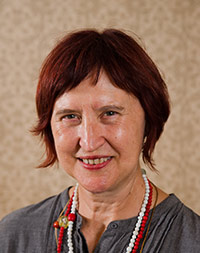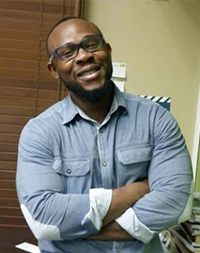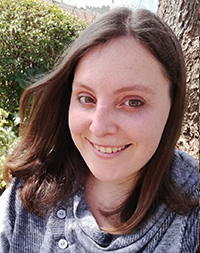Senior Post-Doctoral Fellows: 
Dr Nancy Rushohora is a Postdoctoral Fellow
in Studies in Historical Trauma and Transformation at Stellenbosch University,
South Africa. She holds a PhD in Historical Archaeology from the University of Pretoria
(2016). Her research interests include archaeology of resistance, trauma,
heritage, photographs and memory. Currently, she is working on the Majimaji War—a
resistance against the German colonialism in Tanzania (1904-1908). She is
particularly questioning the removal and restitution of human remains from
Tanzania to Germany and engaging with the use of the war landscape, museum and
memorials.
Post-Doctoral Fellows:
 Dr
Marietjie Oelofsen is a post-doctoral fellow at the Historical Trauma
and Transformation Studies Unit. Her research focus is on how and where
South Africans talk about political trauma across racial and
generational divides, and the possibilities that exist for healing or
recovery through mediating diverse experiences in the public sphere. In
2017, Oelofsen received a PhD from Rhodes University for her thesis, Hearing
the citizens: Inequality, access to journalists and the prospects for
inclusively mediated spaces of political deliberation in South Africa.
This followed an MPhil (cum laude) at the University of Stellenbosch in
which she proposed a re-conceptualisation of the way in which
journalists consider their professional role in order to raise
possibilities for more inclusive public and political conversations.
Marietjie worked as a journalist in South Africa for 11 years, and as a
development communication specialist in the HIV /AIDS sector on the
African continent for almost two decades.’
Dr
Marietjie Oelofsen is a post-doctoral fellow at the Historical Trauma
and Transformation Studies Unit. Her research focus is on how and where
South Africans talk about political trauma across racial and
generational divides, and the possibilities that exist for healing or
recovery through mediating diverse experiences in the public sphere. In
2017, Oelofsen received a PhD from Rhodes University for her thesis, Hearing
the citizens: Inequality, access to journalists and the prospects for
inclusively mediated spaces of political deliberation in South Africa.
This followed an MPhil (cum laude) at the University of Stellenbosch in
which she proposed a re-conceptualisation of the way in which
journalists consider their professional role in order to raise
possibilities for more inclusive public and political conversations.
Marietjie worked as a journalist in South Africa for 11 years, and as a
development communication specialist in the HIV /AIDS sector on the
African continent for almost two decades.’
E-mail: hmoelofsen@sun.ac.za | Click here for publications |Click here for student supervision
 Azille Coetzee is a postdoctoral fellow in Historical Trauma and Transformation where her research is focused on theorising women's narratives about their memories of apartheid, as part of the flagship research project of the Chair. She is interested in the ways in which categories of race and gender intersect in colonial and apartheid violence; how black women's geographies can open up a respatialisation of the South African postapartheid landscape; and how imaginative feminist and queer engagements with the site of memory can enable a new sense of place. She holds a PhD in Philosophy from Stellenbosch University and the Vrije University of Amsterdam. She is the writer of In My Vel: 'n Reis (2019), a memoir exploring white Afrikaner identity, historical complicity, belonging, and love. Her research is published in various international feminist journals and she often writes for local South African publications like Vrye Weekblad and Litnet.
Azille Coetzee is a postdoctoral fellow in Historical Trauma and Transformation where her research is focused on theorising women's narratives about their memories of apartheid, as part of the flagship research project of the Chair. She is interested in the ways in which categories of race and gender intersect in colonial and apartheid violence; how black women's geographies can open up a respatialisation of the South African postapartheid landscape; and how imaginative feminist and queer engagements with the site of memory can enable a new sense of place. She holds a PhD in Philosophy from Stellenbosch University and the Vrije University of Amsterdam. She is the writer of In My Vel: 'n Reis (2019), a memoir exploring white Afrikaner identity, historical complicity, belonging, and love. Her research is published in various international feminist journals and she often writes for local South African publications like Vrye Weekblad and Litnet.

Stephen Temi’ David is a literary scholar
whose research explores the marginal voices and narratives of violence that are
silenced by and buried beneath hegemonic accounts of violence. These marginal
narratives are surfaced through an intersectional approach which pays attention
to the ways in which axes of identity such as gender, class, dis/ability,
ethnicity, and sexuality intersect to produce distinct experiences of violence
and trauma. His current project employs an African Phenomenological approach –
distilled from the works of Africanists like Fanon, WEB Dubois, Steve Biko and
Wole Soyinka – in reading narratives of trauma archived on the wounded bodies
of ex-Biafran soldiers. The project also examines how these wounded bodies and
the traumatic histories they bear unsettle hagiographic, masculinist accounts
of the Nigeria-Biafra Civil War to generate a more nuanced historiographic
encounter with the war and its perpetually haunting legacies.
Stephen holds a PhD in literary studies
from Stellenbosch University (2019) and a master’s degree in African literature
from the University of Ibadan, Nigeria. His doctoral study was funded by the
Faculty of Arts and Social Sciences Graduate School, Stellenbosch University.
He has also received grants and fellowships from funders such as Lisa Maskell,
SSRC, DAAD and Harry Frank Guggenheim. Stephen has shared his work in
peer-reviewed journals, opinion pieces and at local and international
conferences. Stephen’s research interests include memory studies, embodiment,
gender studies, postcolonial literature and violence, African literature,
Yoruba philosophy, popular culture and performance studies.

Dr Melanie Cilliers is
a postdoctoral fellow at the Historical Trauma and Transformation Studies Unit.
Her research interests involve studying the collective influence of structural
violence on the lived experiences of South African people through the lens of physiology,
neurocognitive processes, and social psychology. In 2013 she obtained her MA in
Psychology (cum laude) at the University of Stellenbosch, in which she examined
the resilience characteristics in families caring for a family member living
with dementia. She obtained her PhD in Psychiatry (2020) at the University of
Stellenbosch for her research on the development of a shortened version of the
HNRC International Neurobehavioral Battery. Her current research focus is on the
impact of historical trauma and dehumanization on the lived experiences and
stress sensitivity of people in marginalized South African communities.
Previous Post-Doctoral Fellows:
 Dr. Khan Touseef Osman
is a postdoctoral researcher in Studies in Historical Trauma and
Transformation Studies at Stellenbosch University. He did his PhD on
“Trauma Studies and South Asian Partition Fiction” at the University of
Kashmir, India. His research interests include Trauma and Memory
Studies, Partition Studies and Critical Theory. His current research
explores the transmission of trauma across generations and its
representation in creative media. At present, Dr. Osman is working on
three articles entitled “Postmemory and Imaginative Temporal
Displacement in Agha Shahid Ali’s Early Poetry,” “Representational
Consequences of Trauma for Post-Witness Generation Authors of Partition
Fiction” and “The Struggle of Memory against Forgetting in Kamila
Shamsie’s Salt and Saffron”.
Dr. Khan Touseef Osman
is a postdoctoral researcher in Studies in Historical Trauma and
Transformation Studies at Stellenbosch University. He did his PhD on
“Trauma Studies and South Asian Partition Fiction” at the University of
Kashmir, India. His research interests include Trauma and Memory
Studies, Partition Studies and Critical Theory. His current research
explores the transmission of trauma across generations and its
representation in creative media. At present, Dr. Osman is working on
three articles entitled “Postmemory and Imaginative Temporal
Displacement in Agha Shahid Ali’s Early Poetry,” “Representational
Consequences of Trauma for Post-Witness Generation Authors of Partition
Fiction” and “The Struggle of Memory against Forgetting in Kamila
Shamsie’s Salt and Saffron”.
Click here for publications

